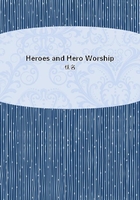
第9章
It is ever the way with the Thinker, the spiritual Hero. What he says, all men were not far from saying, were longing to say. The Thoughts of all start up, as from painful enchanted sleep, round his Thought; answering to it, Yes, even so! Joyful to men as the dawning of day from night;--_is_ it not, indeed, the awakening for them from no-being into being, from death into life? We still honor such a man; call him Poet, Genius, and so forth:
but to these wild men he was a very magician, a worker of miraculous unexpected blessing for them; a Prophet, a God!--Thought once awakened does not again slumber; unfolds itself into a System of Thought; grows, in man after man, generation after generation,--till its full stature is reached, and _such_ System of Thought can grow no farther; but must give place to another.
For the Norse people, the Man now named Odin, and Chief Norse God, we fancy, was such a man. A Teacher, and Captain of soul and of body; a Hero, of worth immeasurable; admiration for whom, transcending the known bounds, became adoration. Has he not the power of articulate Thinking; and many other powers, as yet miraculous? So, with boundless gratitude, would the rude Norse heart feel. Has he not solved for them the sphinx-enigma of this Universe; given assurance to them of their own destiny there? By him they know now what they have to do here, what to look for hereafter.
Existence has become articulate, melodious by him; he first has made Life alive!--We may call this Odin, the origin of Norse Mythology: Odin, or whatever name the First Norse Thinker bore while he was a man among men.
His view of the Universe once promulgated, a like view starts into being in all minds; grows, keeps ever growing, while it continues credible there.
In all minds it lay written, but invisibly, as in sympathetic ink; at his word it starts into visibility in all. Nay, in every epoch of the world, the great event, parent of all others, is it not the arrival of a Thinker in the world!--One other thing we must not forget; it will explain, a little, the confusion of these Norse Eddas. They are not one coherent System of Thought; but properly the _summation_ of several successive systems. All this of the old Norse Belief which is flung out for us, in one level of distance in the Edda, like a picture painted on the same canvas, does not at all stand so in the reality. It stands rather at all manner of distances and depths, of successive generations since the Belief first began. All Scandinavian thinkers, since the first of them, contributed to that Scandinavian System of Thought; in ever-new elaboration and addition, it is the combined work of them all. What history it had, how it changed from shape to shape, by one thinker's contribution after another, till it got to the full final shape we see it under in the Edda, no man will now ever know: _its_ Councils of Trebizond, Councils of Trent, Athanasiuses, Dantes, Luthers, are sunk without echo in the dark night! Only that it had such a history we can all know. Wheresover a thinker appeared, there in the thing he thought of was a contribution, accession, a change or revolution made. Alas, the grandest "revolution" of all, the one made by the man Odin himself, is not this too sunk for us like the rest! Of Odin what history? Strange rather to reflect that he _had_ a history! That this Odin, in his wild Norse vesture, with his wild beard and eyes, his rude Norse speech and ways, was a man like us; with our sorrows, joys, with our limbs, features;--intrinsically all one as we: and did such a work!
But the work, much of it, has perished; the worker, all to the name.
"_Wednesday_," men will say to-morrow; Odin's day! Of Odin there exists no history; no document of it; no guess about it worth repeating.
Snorro indeed, in the quietest manner, almost in a brief business style, writes down, in his _Heimskringla_, how Odin was a heroic Prince, in the Black-Sea region, with Twelve Peers, and a great people straitened for room. How he led these _Asen_ (Asiatics) of his out of Asia; settled them in the North parts of Europe, by warlike conquest; invented Letters, Poetry and so forth,--and came by and by to be worshipped as Chief God by these Scandinavians, his Twelve Peers made into Twelve Sons of his own, Gods like himself: Snorro has no doubt of this. Saxo Grammaticus, a very curious Northman of that same century, is still more unhesitating; scruples not to find out a historical fact in every individual mythus, and writes it down as a terrestrial event in Denmark or elsewhere. Torfaeus, learned and cautious, some centuries later, assigns by calculation a _date_ for it:
Odin, he says, came into Europe about the Year 70 before Christ. Of all which, as grounded on mere uncertainties, found to be untenable now, I need say nothing. Far, very far beyond the Year 70! Odin's date, adventures, whole terrestrial history, figure and environment are sunk from us forever into unknown thousands of years.